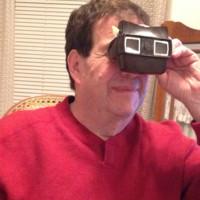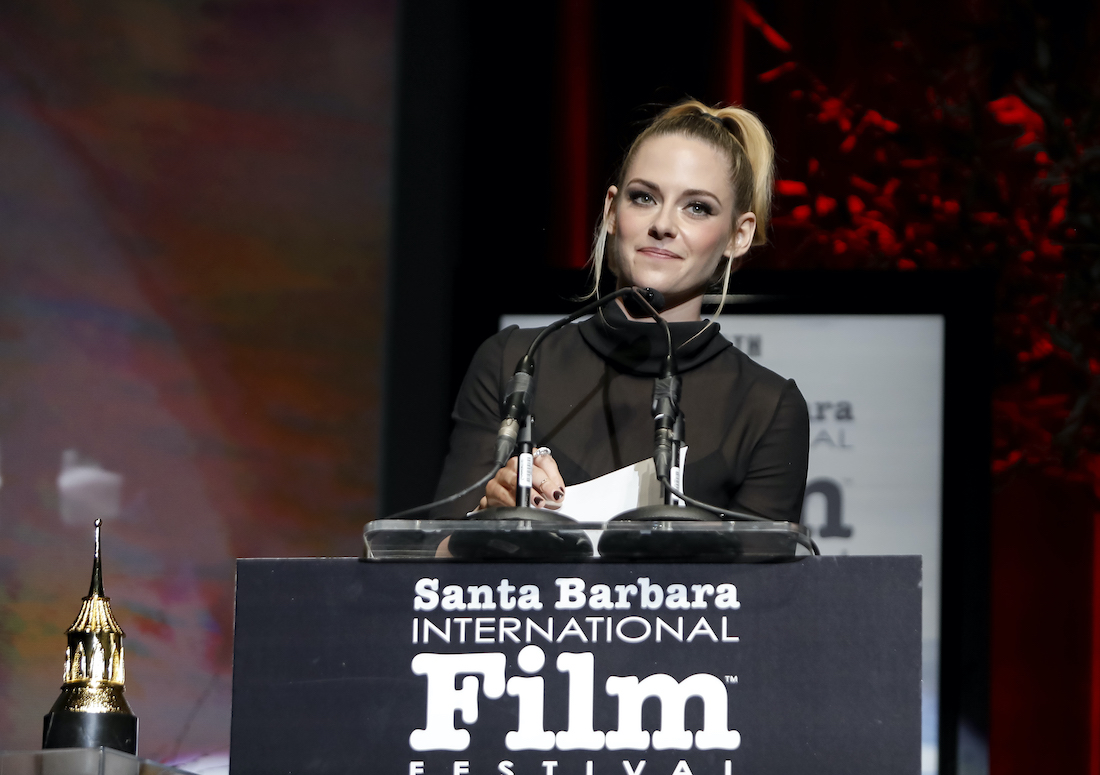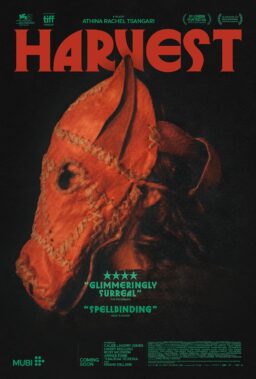“Isn’t it great to be in a movie theater?”
So Leonard Maltin kicked off a tribute evening to Nicole Kidman and Javier Barden at the 37th edition of the Santa Barbara Film Festival, which ran from March 2-12.
These tributes have become the film festival’s bailiwick. Most of the honorees are Oscar-nominated, and the timing of the festival—in the thick of Oscar season—gives the event added juice.
Leonard Maltin himself has moderated festival tribute evenings for decades, prompting festival executive director Roger Durling to add Maltin’s name to its Modern Master Award.
This year’s line-up was especially note-worthy, not to mention Oscar-worthy. In addition to the fete for Barden and Kidman, we virtually “attended” tributes to Kristen Stewart, Will Smith and Aunjanue Ellis, and Benedict Cumberbatch.
Not all Hollywood A-listers and global movie stars handle celebrity with equal aplomb. Case in point: Kristen Stewart, the recipient of the festival’s American Riviera Award. She sat restlessly through her tribute, one of her crossed legs in constant movement. Host Anne Thompson, the Editor-at-Large at Indiewire, shared with the audience that with each film clip spanning Stewart’s 44 films over a 22-year career, Stewart audibly groaned.
Stewart, Thompson said, has grown up before our eyes. She was 8 when she had an uncredited role in the direct-to-video “The Flintstones in Viva Rock Vegas,” and 12 when she held her own with Jodie Foster in David Fincher’s “Panic Room.” She has often appeared ill-at-ease on the talk show circuit, but on this night, talking about the work and not saddled with promoting her latest project, she was charmingly good-humored. “I take pride in being a little spastic, restless, and instinctive,” she remarked at one point.
The “Twilight” franchise, in which Stewart starred as Bella “I was born to be a vampire” Swan, catapulted her to superstardom. She recalled when she knew she had “made it.” She was sitting on a porch with her dogs at her feet “smoking a bowl” with her boyfriend when she was “papped,” meaning the paparazzi snapped a photo of her. “I look back on that moment with fondness,” she joked. She also cited “the sound and fury” of her first appearance at Comic-Con as a signifier of her new normal.
But Stewart, Thompson noted, defied conventional career wisdom by taking a series of challenging roles working with foreign directors, including Olivier Assayas (“Cloud of Sils Maria,” for which she became the first American actress to win a Cesar award), Walter Salles (“On the Road”) and Pablo Larrain (“Spencer,” which earned Stewart her first Oscar nomination).
When Thompson asked why she sought these unexpected roles, Stewart replied, “I’m kind of a masochist. I love how scary it is.”
She teased that she is prepping her directorial debut. “I’m trying to put a movie together,” she said. “I have a couple of balls in the air. I’m very excited.”
At evening’s end, Charlize Theron, her “Snow White and the Huntsman” costar, presented Stewart with her award. “She keeps it real,” Theron praised. “She loves how acting hurts. (In “Snow White”) I hunted her down for her youth and beauty, and nothing’s changed.”
Theron offered that Stewart seemed more poised in these press and public situations.
“It’s hit or miss,” Stewart responded.

The ebullient Will Smith was a stark contrast to the more reticent Stewart. Smith, shared the festival’s Outstanding Performer award with his fellow-Oscar-nominated “King Richard” costar Aunjanue Ellis. They portray Richard Williams and Oracene Price, the parents of future tennis icons, Venus and Serena Williams.
He took the festival stage with a series of arm-pumping whoops, disarming the crowd right from the get-go by self-deprecatingly warning the moderator, Hollywood Reporter awards columnist Scott Feinberg, to “stay out of’ ‘Wild Wild West.'”
Smith needs no introduction. One can’t help but think of Dana Carvey’s Mickey Rooney impression when Feinberg noted that there was a time when Smith was the biggest movie star in the world with such back-to-back blockbusters as “Independence Day” and “Men in Black.”
“I was on a little bit of a run,” he deadpanned.
Initially a rapper (he was the first to win a Grammy for Best Rap Performance), Smith said he was singularly determined to be a movie star. There was no work-life balance early in his career, he admitted. “Like an athlete in prime condition, I stayed ready so I didn’t have to get ready. I wanted to play with the best, so there were no drugs, no drink, no partying.”
Smith and his creative partner rented the top 10 movies of all time to determine if there was a pattern to them. All were special effects movies with monsters and a love story. Basically, Smith told the rapturous crowd, “I wanted to be Eddie Murphy in ‘Star Wars.’”
For Ellis, stardom was less meteoric and more a train that in the last five years has been picking up steam, she said, with such critically-acclaimed performances as the supremely unlikeable character Mrs. Hunt in “If Beale Street Could Talk.” “Leaning into that and not caring what anyone thought of me was so liberating,” she said. “It was one of the most fun experiences I’ve ever had. I love creating characters; the goal is not to be me.”
Her interest in acting was kindled in her church. “If you were raised in the church in the South,” she explained, “you are a thespian. You have to be in the Easter play, the Valentine’s Day play …”
On a field trip from Mississippi to New York, she saw her first professional play: Fences starring Courtney B. Vance. “He was the first person I saw on stage,” she said. “I later played his wife (on ‘Lovecraft Country’).”
One of the more touching experiences of the tribute came with the showing of a clip from the emotional kitchen scene in “King Richard,” after which Smith shared with the audience that Ellis whispered in his ear that that was the first time she had seen it. Smith joked, “You should see some of your movies, they’re fantastic.”
Smith defused a tense situation after someone poured a drink on an exuberant woman and security was called. Turning to Ellis, he said, “That’s why it’s important to have white audiences because that would’ve gone differently where you and I grew up.” When he asked Ellis what she would have done in that situation, she mimed combatively taking off her earrings.

Never mind “The Power of the Dog.” Behold the power of Benedict Cumberbatch. He sold out the 2,300-seat Arlington Theatre, the only tribute recipient to do so.
Cumberbatch was the recipient of the festival’s Cinema Vanguard Award, which his “Power of the Dog” director Jane Campion presented to him. The so-called “Cumberbitches” were out in force. Alternate nicknames for his fan base, Campion noted with exaggerated disapproval, are “Cumberbunnies” and “Ben-addicts.”
Pete Hammond, Deadline’s chief film critic, charted Cumberbatch’s electrical career from television (“Sherlock,” “Patrick Melrose”) and art house indies (“The Imitation Game,” for which he received his first Best Actor Oscar nomination) through recent blockbusters “Dr. Strange,” “Star Trek Into Darkness” and “The Hobbit: The Desolation of Smaug.”
Cumberbatch has had a remarkable past 12 months with the release of five critically-acclaimed movies, including “The Courier,” “The Electrical Life of Louis Wain” “Spider-Man: No Way Home,” “The Mauritanian” and “The Power of the Dog,” for which he is nominated for Best Actor.
“It’s hard to take stock,” he said.
Fun facts gleaned from the Cumberbatch tribute: His parents are still working actors in their 80s. He prefers “Star Wars” to “Star Trek.” As for “Sherlock” and the prospect of reprising his breakout role, he teased, “Never say never.”
Cumberbatch is also a sought-after voice actor. One of the more memorable clips shown that night was a behind-the-scenes glimpse of Cumberbatch performing as the dragon Smaug, evocatively crawling in character outfitted with Motion Capture sensors.
Hammond playfully referred to Vulture’s reference to Cumberbatch as “the new king of celebrity impressionists. Cumberbatch obliged with spot-on impressions of Jack Nicholson, Michael Caine, Christopher Walken and Tom Holland.
The film clips were testament to Cumberbatch’s range as well as the diverse projects he’s done. Among his lesser-known films is “Starter for 10,” which Hammond referred to as “the ‘American Graffiti” of British films with an off-the-charts before-they-were-stars cast, including Dan Stevens, James McAvoy, Rebecca Hall, James Corden and Catherine Tate.
His most recent career triumph, Phil Burbank in “The Power of the Dog” is a role that Paul Newman expressed interest in pursuing in the 1960s. Cumberbatch acknowledged Burbank’s “intolerable and dangerous behavior” but added that “we need to examine the searing pain behind him.”
In her remarks, Campion praised that his performance in a “monumentally difficult” role had given her “a lifetime high”: “Your Phil Burbank exposed the grief and tenderness in a terrible man, a difficult man I never knew could be seen. You opened the heart of a tyrant and found his fragility. Every generation has their wunderkinds. First there was Olivier, then there was Daniel Day-Lewis. Now there’s you.”

The festival tributes concluded with Kidman and Barden, the Oscar-nominated costars of Aaron Sorkin’s “Being the Riccardos.” Barden, present, and Kidman via remote (she was felled by a pulled hamstring) were presented with the festival’s Maltin Modern Master award.
Kidman was up first. It was her first appearance at the festival since 2011 for “Rabbit Hole,” one of the films that fulfilled her mission statement when she arrived for the first time in the United States to make “Days of Thunder.”
She recalled that her thoughts at that time were, “I’m actually here; I hope I don’t get cast as the girlfriend or the best friend and get to explore female characters in depth.”
The clips shown this night mostly focus on the films which represented in Maltin’s words, “big risks,” such as Lars von Trier’s “Dogville.” Kidman described herself as an actor “who will travel anywhere, anytime as long as I believe in it.”
Her mantra: “Give it a go.”
Barden was in high spirits, jokingly apologizing to anyone in the audience who might have been hoping to see Antonio Banderas.
He was most animated discussing his Oscar-winning role as hitman Anton Chigurh in the Coen brothers’ “No Country for Old Men.” He recalled that he did not understand the script. “I sat down with them,” he recalled, “And I said, ‘I don’t drive, I hate violence, and my English is not very good.” The Coen brothers’ response: “That’s why we want you.”
He gave a shout out to actor Gene Jones, with whom Barden shared the tense scene in a gas station where Jones’ attendant begins to suspect that he may be tossing a coin for his very life. “The secret to that scene was his fear,” Barden praised. “His fear made my character more fearful.”
The night concluded with a taped message from painter Julian Schnabel, who directed Barden to an Oscar nomination in “Before Night Falls.” He called the actor “a master,” prompting Barden to whip out his cell phone and call Schnabel right there and then. There was no answer.
“I didn’t realize it was late in New York City,” he sheepishly said to the audience. “I think everyone is on my time.”












